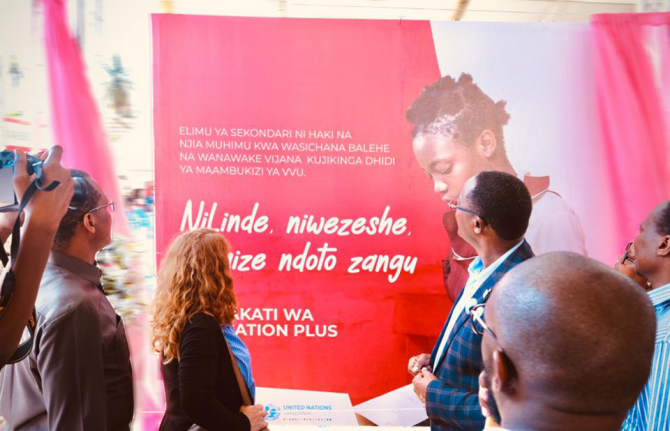

Feature Story
Tanzania commits to invest in secondary education as part of efforts to keep boys and girls free from HIV
16 December 2022
16 December 2022 16 December 2022Tanzania became the 13th African country to join the Education Plus Initiative, committing to provide greater investments to ensure boys and girls complete secondary school.
Education Plus is an initiative spearheaded by UNAIDS to accelerate action and investments in education to prevent HIV. Evidence shows that completing secondary education reduces the risk of HIV infection and early pregnancy and improves their livelihoods and prosperity for girls and young women. The education Plus initiative is centred on empowering adolescent girls and young women and achieving gender equality in sub-Saharan Africa.
On 30 November 2022, during the HIV week commemoration, the Office of the Prime Minister, led by the Minister of State for Policy, Coordination and Parliamentary Affairs, Mr George Simbachawene, alongside the Deputy Minister of Health Dr Godwin Mollel, launched the initiative in Lindi region, Tanzania.
"Young people aged 15-24 years make up one of the largest groups of new infections, among all new infections every year, approximately 30% are among people aged 15–24. That means for every 10 new infections, three are from this age group,'" said Mr. Simbawachane
The launch of Education Plus in Tanzania will accelerate the ongoing country's adolescent education, health and wellbeing agenda. Tanzania has been particularly affected by HIV. In 2021 around 1.7 million people were living with HIV; 74% of new HIV infections among young people aged between 15 and 24 were among young women, showing the disproportionate impact HIV is having on young women and girls.
Minister Simbachawene said the country would increase primary education opportunities for adolescents and enable them to stay in school by removing all barriers to completion of primary and secondary school education. Through the initiative, Tanzania will strengthen efforts to bring HIV education, reproductive health, and life skills to adolescents inside and outside of school.
The initiative comes at a time when Tanzania has made good progress in adopting global treaties and agreements to address gaps in education and health rights and increase opportunities for girls and boys. Most commitments have been translated into national policies and strategies, as demonstrated by the government’s commitment to offering free basic and secondary education. Tanzania has also adopted policy decisions to implement a re-entry program for children who drop out and to include comprehensive sexuality education into the curriculum. The country has also amended the HIV and AIDS Act to lower the age of consent for HIV testing and allow HIV self-testing.
The minister also pledged to do more to eliminate gender-based and sexual violence by providing youth-friendly education, skills building, and enhancing referrals by connecting youth to health and community services.
However, key gaps remain, with national surveys showing increased rates of teenage pregnancy, school dropouts, and high levels of gender-based violence. Around 27% of young women aged between 15 and 19 years already have a child or are pregnant and 50% of ever-married women aged between 15 and 49 report experiencing physical, sexual, or emotional violence.
The total number of students enrolled in secondary education is still below 50%, and for those in school, there is a high dropout rate, and some do not complete their schooling. The country has a low completion rate in secondary schools at 11.3%, and dropout in secondary schools due to pregnancy was reported at 4% in 2020.
Despite increased political will and significant achievements, women's and girls' vulnerabilities remain very high. Adolescent girls and young women in Tanzania continue to shoulder the burdens of domestic work, gender inequality in education, and harmful norms. Many are entrenched in cycles of poverty and extreme vulnerabilities.
At the launch, the government committed to strengthening policies to facilitate the provision of education and essential skills to prepare and equip young people for employment and other economic opportunities.
The launch was attended by key partners including Dr Leonard Maboko, the Executive Director for Tanzania Commission for AIDS (TACAIDS) youth representative Pudensiana Mbwiliza; Permanent secretary office of the Prime Minister, Dr John Jingu and Hon Judith Nguli from Lindi Regional Commissioner’s office and Tanzania PEPFAR coordinator Jessica Greene; representatives from UNAIDS, UNESCO, International Labour Organisation (ILO), UNICEF and the World Health Organisation (WHO).
The event brought together civil society organisations, young people’s networks, and representatives of people living with HIV and partners. Co-lead by five United Nations agencies working with governments, women’s and youth movements; the initiative is of even greater urgency as the COVID-19 pandemic has pushed millions of African girls out of school.



